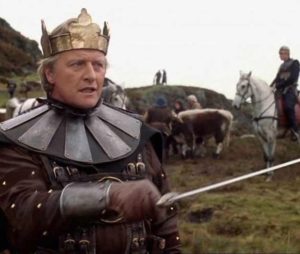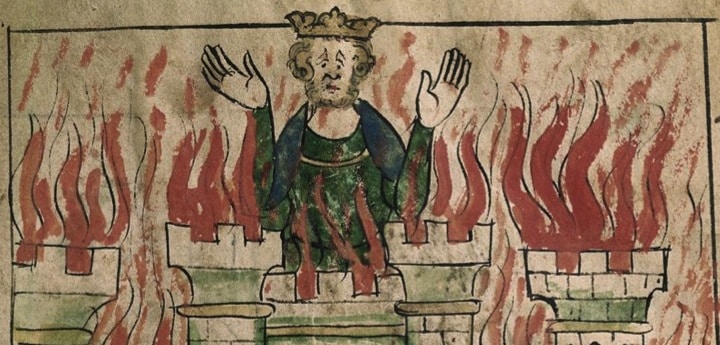Vortigern, called “Gurthigern” by monk Gildas, was a 5th century ruler known for inviting the Saxons to Britain in order to stop the Picts and Scots from their incursions and allowing them to control the land. Vortigern is not a name per se; it means “Supreme Lord”. His actual name is unknown as are many details about his life. There are many histories that mention him and his account on Saxon migration to England.
The Legend of Vortigern
 The story narrates that after the death of Constantine II the nobles were deciding which of the king’s youngest sons (Uther and Aurelius) would inherit the authority of the kingdom. Vortigern suggested that Constans, the eldest son, should be king. However, Constans was to become a monk and was persuaded by Vortigern to leave the monastery and become king. He agreed and became king of Britain, with Vortigern as his chief adviser. Vortigern then advised Constans to hire Picts as mercenaries, who does so and is assassinated by the Picts through Vortigern’s deceptions, thus seizing power and becoming king.
The story narrates that after the death of Constantine II the nobles were deciding which of the king’s youngest sons (Uther and Aurelius) would inherit the authority of the kingdom. Vortigern suggested that Constans, the eldest son, should be king. However, Constans was to become a monk and was persuaded by Vortigern to leave the monastery and become king. He agreed and became king of Britain, with Vortigern as his chief adviser. Vortigern then advised Constans to hire Picts as mercenaries, who does so and is assassinated by the Picts through Vortigern’s deceptions, thus seizing power and becoming king.
Later, he decided to employ the Saxons as mercenaries to fight the Picts. The Jutish brothers Horsa and Hengist arrived in their ships, invited to live in Kent by the king. They were apparently coming to fight for Britain, but they always had the intention of taking the Island. Employing them as mercenaries was successful, as they drove the Picts away, but Vortigern’s own forces were not strong enough to fight the mercenaries he had brought into his land. The mercenaries started to demand more and more supplies and food, and soon, a dispute occurred over the payments he was to give to the mercenaries and all negotiations went downhill.
Not long after that, the Angles and Picts joined forces, taking advantage of Vortigern’s weakness. Some legends about this crisis talk about Vortigern marrying Hengist’s daughter in the hopes of easing tensions, to no avail. The Britons became overwhelmed and fled from Kent to London. The Saxons ravaged the Britons for several centuries, eventually dominating the entire Island, thus leading Vortigern to be remembered as a wicked king for his decision to let them in.
According to scholar Rutherford, there’s the chance Vortigern believed in a Celtic practice known as Celsine, where a weaker party offered their service to a stronger one in their times of need and the relationship ended once the crisis was over. Placing the Britons under the protection of the Saxons seemed like a good idea at the beginning, but the Saxons didn’t recognize the principles of Celsine once the Picts and Scots were driven off. Historically speaking, these claims might make sense. The chaotic situation in Britain after the Roman legions withdrew was evident: The Britons were having a hard time defending themselves against the invaders from the north until a leader, in some stories known as Aurelianus, and in other as Arthur, was able to lead them.
The Historical View
The different historical sources have different points of view about hVortigern. Gildas, who calls him “Supreme Lord”, claims that he asked the Saxons to come after bestowing with a council and blames him for the invasion. Bede who first calls him “Vortigern” says he is responsible for the Saxons and the actions committed by them.
Nennius presents him as a weak-willed fool who couldn’t compete with the Saxon king (Hengist) and was manipulated, letting the Saxons dominate the Britons. Malmesburry describes him as a slave to his desires, even though the Britons felt helpless after his death. Monmouth gave the fullest description of him as a villain and Wace, the French poet, follows the ideas of Nennius and Monmouth.
Geoffrey Ashe, a scholar, points out that Vortigern could have been acting according to the Roman practice by employing federates to fight for his cause. Federates were nothing more than barbarians who were promised lands and good payment for their services. As one can see, the employment of federates did not always go as expected or according to “law”, Vortigern’s case being the perfect example of a disaster.
Conclusion
 Regardless of what his intentions were, none of the writers holds him in high regards. He might have been connected to central Wales, South Wales and Gloucester. These writers were mostly Celtic Welshmen, and they probably see Vortigern as a really foolish man for believing that non-Celts would respect Celsine. Also, Vortigern might have married a daughter of Maximus, the rebel Roman emperor who made an expedition from Britain to the Continent. Rutherford suggested that he might have been expecting to use the old practice on the Saxons to control them. He never considered that non-Celtic people didn’t know of such practice and honors or might not honor them even if they knew about it.
Regardless of what his intentions were, none of the writers holds him in high regards. He might have been connected to central Wales, South Wales and Gloucester. These writers were mostly Celtic Welshmen, and they probably see Vortigern as a really foolish man for believing that non-Celts would respect Celsine. Also, Vortigern might have married a daughter of Maximus, the rebel Roman emperor who made an expedition from Britain to the Continent. Rutherford suggested that he might have been expecting to use the old practice on the Saxons to control them. He never considered that non-Celtic people didn’t know of such practice and honors or might not honor them even if they knew about it.
In the story, Vortigern was pardoned, but lost much of Britain. He flew to Wales where he tried to build a castle on top of the hill. With the help of Merlin, he eventually did. Uther and Aurelius, who had retreated to Brittany for their safety, returned with a large army and with the intention of disposing Vortigern. In the end, the castle was put to torch and he died in the fire. According to Gildas and Bede, this is when Aurelianus becomes the king and frees the land.
The thing about Vortigern is that he will most likely be known as nothing more than the ruler who allowed the Saxons to control his land and his citizens, an infamous king for eternity. Monmouth established Vortigern as the villain and the traitor of his country with the same accuracy that he created the character of King Arthur. If the claims of both Rutherford and Ashe are correct, and he only meant the best for his land, he can be depicted as one of the most tragic heroes. His story remained well known after the Middle Ages, especially in Great Britain. He is a major character in The Birth of Merlin, King of Kent and some Jacobean plays.

